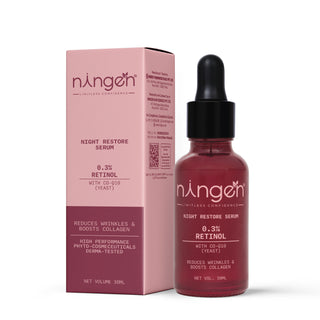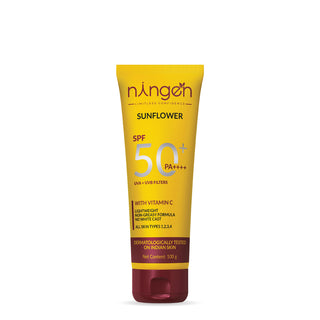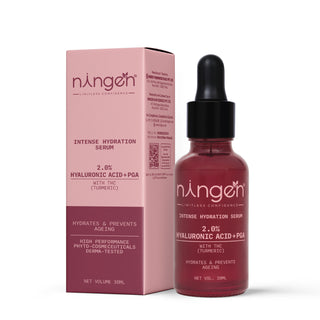What is Retinol?
If you're new to the world of skincare and want to try using retinol, you've come to the right place! Retinol can do amazing things for your skin, like making it smoother and reducing wrinkles. But it can also be a bit confusing at first. Don't worry, though – we're here to help.
In this beginner-friendly guide, we'll explain how to start with Retinol and how to start using it in your daily routine. So, if you're ready to take your skincare game to the next level, let's dive in!
What Are The Skincare Benefits of Using Retinol?
Experience the remarkable effects of Retinol for glowing skin. Renowned for its unmatched advantages outlined below:
Diminished Wrinkles and Fine Lines:
- Stimulates collagen synthesis, enhancing skin elasticity.
- Reduces the visibility of fine lines and wrinkles.
Enhanced Skin Texture:
- Accelerates skin cell turnover, resulting in smoother skin.
- Diminishes rough patches and uneven skin texture.
Balanced Skin Tone:
- Fades dark spots and hyperpigmentation.
- Achieves a more uniform and radiant complexion.
Acne Management:
- Regulates sebum production, preventing pore blockages.
- Aids in acne treatment and reducing breakouts.
Increased Skin Firmness:
- Boosts skin resilience and firmness.
- Enhances overall skin structure.
Prevention of Premature Aging:
- Functions as an antioxidant, neutralizing harmful free radicals.
- Shields against environmental damage, thwarting premature aging.
Improved Hydration:
- Enhances the skin's moisture retention capability.
- Diminishes dryness, fostering a hydrated and plump appearance.
Reduced Pore Size:
- Assists in clearing pores and minimizing their appearance.
- Creates a smoother skin surface.
Sun Damage Treatment:
- Aids in repairing sun-induced skin damage.
- Addresses sunspots and signs of photoaging.
Overall Skin Revitalization:
- Supports cellular renewal for a revitalized and fresh appearance.
- Contributes to healthier and more youthful-looking skin.
When Should You Start Using Retinol?
The ideal time to start using retinol largely depends on individual skin concerns and goals. Generally, retinol can be introduced into a skincare routine in one's mid to late 20s or early 30s, as this is when collagen production starts to decline and signs of aging may become more apparent. However, individuals with specific skin concerns, such as acne, hyperpigmentation, or sun damage, may benefit from starting retinol earlier.
Note: Click here to learn more about anti-aging serums.
How To Start With Retinol Into Skincare Routine?
Here are some vital factors while incorporating Retinol in a skincare routine. Let’s discuss those one by one.
Choosing the Right Product:
When selecting a retinol product, it's crucial to start with a lower concentration to minimize the risk of irritation, especially for beginners. Look for products labeled as "gentle," "beginner-friendly," or with lower percentages of retinol (typically around 0.25% to 0.5%). Opt for products with additional soothing ingredients like hyaluronic acid, niacinamide, or ceramides to help mitigate any potential irritation.
Start Slowly:
One of the most common mistakes beginners make when incorporating retinol is using it too frequently or applying too much product. To avoid overwhelming your skin, start by using retinol only 2-3 times a week, preferably at night. Begin with a pea-sized amount for your entire face, gradually increasing frequency and amount as your skin builds tolerance. Then start using daily bedtime.
Prep Your Skin:
Before applying retinol, ensure your skin is clean and dry. Start with a gentle cleanser to remove makeup, dirt, and impurities. Follow up with a hydrating toner to balance the skin's pH and prepare it for better absorption of the retinol product.
Apply Retinol Correctly:
When applying retinol, less is more. Dispense a pea-sized amount onto your fingertips and dot it evenly across your face, avoiding the delicate eye area and lips. Gently massage the product into your skin using upward motions, focusing on areas prone to fine lines and wrinkles. Allow the retinol to absorb fully before applying any additional products.
Moisturize and Protect:
After applying retinol, follow up with a nourishing moisturizer to help lock in moisture and soothe the skin. Look for a moisturizer rich in hydrating ingredients like glycerin, shea butter, hyaluronic acid or ceramides to counteract any potential dryness or irritation caused by retinol. Finally, don't forget to apply sunscreen during the day, as retinol can increase sun sensitivity. Opt for a broad-spectrum SPF 30 or higher to protect your skin from harmful UV rays.
Be Patient:
Results from retinol typically take time to become apparent, so patience is key. It may take several weeks to months of consistent use before noticing significant improvements in your skin's texture, tone, and overall appearance. Remember that everyone's skin is different, so what works for one person may not necessarily work for another. Be consistent with your retinol routine and adjust as needed based on your skin's response.
Monitor Your Skin:
As you incorporate retinol into your skincare routine, pay close attention to how your skin reacts. Some initial side effects, such as redness, dryness, or mild peeling, are normal as your skin adjusts to the product. However, if you experience persistent irritation or severe reactions, such as burning or excessive peeling, discontinue use and consult a dermatologist.
Can All Skin Types Use Retinol?
While retinol can benefit many skin types, it may not be suitable for everyone, especially those with sensitive or easily irritated skin. Individuals with dry or sensitive skin may experience increased dryness, redness, or irritation when using retinol. However, advancements in skincare formulations have led to the development of milder retinol products designed specifically for sensitive skin types.
If you have specific skin concerns or conditions, such as eczema, rosacea, or dermatitis, it's essential to consult with a dermatologist before using retinol. They can assess your skin's condition and provide personalized recommendations to ensure the safety and effectiveness of incorporating retinol into your skincare routine.
The Best Skin Care Ingredients to Use With Retinol:
When incorporating retinol into your skincare routine, it's essential to choose complementary ingredients that work synergistically to maximize benefits while minimizing potential irritation. Here are some skincare ingredients that pair well with retinol:
Hyaluronic Acid:
- Hyaluronic acid is a hydrating powerhouse that attracts and retains moisture in the skin. When used alongside retinol, it helps counteract dryness and maintains skin hydration, promoting a plump and dewy complexion.
Niacinamide (Vitamin B3):
- Niacinamide is known for its soothing and anti-inflammatory properties. It helps to strengthen the skin barrier, reduce redness, and minimize the risk of irritation associated with retinol use. Additionally, niacinamide can help improve skin texture and tone, making it an excellent companion to retinol.
Ceramides:
- Ceramides are essential lipids found naturally in the skin's barrier. Incorporating ceramides into your skincare routine alongside retinol helps replenish and strengthen the skin barrier, reducing moisture loss and enhancing overall skin health.
Peptides:
- Peptides are amino acid chains that stimulate collagen production and improve skin elasticity. When combined with retinol, peptides help support the skin's structural integrity, reducing the appearance of wrinkles and fine lines for a smoother and firmer complexion.
Antioxidants:
- Antioxidants such as, vitamin E, and green tea extract help neutralize free radicals and protect the skin from environmental damage. Using antioxidant-rich products alongside retinol enhances the skin's defense mechanisms and promotes a more youthful and radiant complexion.
Anti-inflammatory Agents:
- Ingredients like aloe vera, chamomile extract, and oat extract have soothing and calming properties that help alleviate redness and irritation associated with retinol use. Using products containing anti-inflammatory agents alongside retinol can help minimize potential sensitivity and promote a more comfortable experience.
When combining retinol with other skincare ingredients, it's essential to patch-test new products and introduce them gradually into your routine to assess compatibility and minimize the risk of irritation. Additionally, using sunscreen during the day is crucial when using retinol, as it can increase the skin's sensitivity to the sun. If you have specific skin concerns or conditions, consult with a dermatologist for personalized recommendations tailored to your needs.
Note: Know more about Retinol from our other article on the power of retinol.
When to Expect Results?
The timeframe for seeing results from using retinol can vary depending on individual factors such as skin type, the concentration of retinol used, frequency of application, and specific skin concerns. However, in general, it typically takes several weeks to months of consistent use before noticeable improvements become apparent.
For some individuals, especially those with more significant signs of aging or skin damage, results may start to become visible within the first few weeks of using retinol. These initial changes may include a reduction in fine lines, improved skin texture, and enhanced overall radiance.
However, for others, especially those with less severe skin concerns or more sensitive skin, it may take longer to see noticeable improvements. In such cases, patience and consistency are key. It's essential to continue using retinol as directed, even if results are not immediately visible, as the benefits often become more apparent over time with continued use.
It's also worth noting that some individuals may experience temporary side effects such as redness, dryness, or peeling during the initial stages of using retinol. These side effects are typically mild and can be managed with proper skin care techniques, such as using a moisturizer or adjusting the frequency of retinol application.
Why Do Some Skin Types React to Retinol?
Some skin types may react to retinol due to various factors, including:
- Sensitivity: Individuals with sensitive skin may be more prone to experiencing irritation or adverse reactions when using retinol. Retinol can be potent and may cause stinging, redness, dryness, or peeling in sensitive individuals.
- Dryness: Retinol has exfoliating properties that can lead to increased dryness, particularly in individuals with already dry skin. Insufficient hydration or moisture barrier function can exacerbate the drying effects of retinol, leading to discomfort or irritation.
- Barrier Disruption: Retinol can temporarily disrupt the skin's barrier function, making it more susceptible to irritation and environmental stressors. Individuals with compromised barrier function, such as those with conditions like eczema or rosacea, may experience heightened sensitivity to retinol.
- Overuse or Incorrect Application: Using retinol too frequently or applying it incorrectly can increase the risk of irritation or adverse reactions. It's essential to follow the recommended usage instructions and start with a lower concentration of retinol to minimize potential side effects.
- Sun Sensitivity: Retinol can increase the skin's sensitivity to the sun, making it more susceptible to sunburn and sun damage. Failure to use adequate sun protection, such as sunscreen, can exacerbate sun sensitivity and lead to adverse reactions.
- Product Formulation: The formulation of the retinol product itself can influence its tolerability and compatibility with different skin types. Some formulations may contain additional ingredients or additives that can exacerbate sensitivity or irritation in certain individuals.
- Individual Variation: Each person's skin is unique, and what works well for one individual may not necessarily work for another. Factors such as genetics, hormonal fluctuations, and lifestyle habits can all influence how the skin responds to retinol.
Overall, while retinol can offer significant benefits for many skin types, it's essential to proceed with caution, especially for individuals with sensitive or reactive skin. If you experience persistent or severe irritation when using retinol, it's advisable to discontinue use and consult with a dermatologist for personalized recommendations.
What Ingredients to Avoid Mixing with Retinol?
When incorporating retinol into your skincare routine, it's essential to be mindful of certain ingredients that may interact negatively with retinol or increase the risk of irritation. Here are some ingredients to avoid mixing with retinol:
Alpha Hydroxy Acids (AHAs):
- AHAs, such as glycolic acid and lactic acid, are chemical exfoliants that can enhance skin renewal and improve texture. However, when used alongside retinol, AHAs can increase the risk of irritation and sensitivity, as both ingredients can be exfoliating and potentially drying to the skin.
Beta Hydroxy Acids (BHAs):
- BHAs, such as salicylic acid, are another type of chemical exfoliant commonly used to unclog pores and treat acne. Like AHAs, BHAs can increase skin sensitivity and irritation when used concurrently with retinol, as they both have exfoliating properties that may be too harsh when combined.
Vitamin C:
- While vitamin C offers antioxidant benefits and can help brighten the skin, it's best to avoid using it at the same time as retinol. Vitamin C is acidic and may lower the pH of the skin, potentially causing irritation or destabilizing the retinol formulation. To avoid potential interactions, consider using vitamin C in your morning routine and retinol in the evening.
Benzoyl Peroxide:
- Benzoyl peroxide is a common ingredient found in acne treatments due to its antibacterial properties. However, when used alongside retinol, benzoyl peroxide may deactivate retinol and reduce its effectiveness. It's best to avoid using these ingredients together to ensure optimal results from both products.
Physical Exfoliants:
- Physical exfoliants, such as scrubs or brushes, can be too abrasive when used alongside retinol, leading to increased irritation and potential damage to the skin barrier. Instead of physical exfoliation, opt for gentler methods of exfoliation or avoid exfoliating altogether while using retinol.
Harsh Cleansers:
- Avoid using harsh or drying cleansers that may strip the skin of its natural oils when using retinol. Opt for gentle, hydrating cleansers that help maintain the skin's moisture barrier and minimize the risk of irritation.
Other Retinoids:
- Using multiple retinoid products simultaneously can increase the risk of irritation and over-exfoliation. Stick to one retinol product at a time to avoid overwhelming the skin and allow it to adjust gradually to the retinol.
It's essential to patch-test new products and introduce them gradually into your routine to assess compatibility and minimize the risk of irritation. If you have specific concerns or questions about mixing retinol with other ingredients, consult with a dermatologist or skincare professional for personalized recommendations tailored to your individual needs.
Is It Okay To Use Retinol if You Have Sensitive Skin?
Using retinol when you have sensitive skin requires careful consideration and a cautious approach. While retinol can provide numerous benefits for the skin, its potent nature may lead to irritation, redness, dryness, or flakiness, especially in individuals with sensitive skin. However, many people with sensitive skin can still incorporate retinol into their skincare routine successfully by following these tips:
- Start Slowly: Begin with a lower concentration of retinol and gradually increase frequency and strength as your skin adjusts. Starting slowly allows your skin to acclimate to the retinol and minimizes the risk of irritation.
- Choose Gentle Formulations: Look for retinol products specifically formulated for sensitive skin, which often contain soothing ingredients like niacinamide, ceramides, or peptides to help mitigate potential irritation.
- Buffer with Moisturizer: Apply a moisturizer before or after retinol to create a protective barrier and help minimize dryness and irritation. This technique, known as buffering, can help make retinol more tolerable for sensitive skin.
- Use Sparingly: Apply a pea-sized amount of retinol to your entire face, avoiding the delicate eye area and lips. Using too much retinol or applying it too frequently can increase the risk of irritation, particularly for sensitive skin.
- Apply at Night: Retinol can increase the skin's sensitivity to sunlight, so it's best to use it in the evening as part of your nighttime skincare routine. Always follow up with a broad-spectrum sunscreen during the day to protect your skin from UV damage.
- Patch Test: Before applying retinol to your entire face, perform a patch test on a small area of skin to assess for any adverse reactions or sensitivity. If irritation occurs, discontinue use and consult with a dermatologist.
- Monitor Your Skin: Pay close attention to how your skin responds to retinol and adjust your routine as needed. If you experience persistent or severe irritation, reduce the frequency of retinol use or switch to a milder formulation.
- Consult a Dermatologist: If you have concerns about using retinol with sensitive skin or experience significant irritation, it's essential to seek guidance from a dermatologist. They can provide personalized recommendations and help you navigate the use of retinol safely and effectively.
Dos and Don'ts of Retinol

Explore our curated range of anti-aging skincare. Delve into our meticulously chosen products in the dedicated section provided below.
The Takeaway
Hope this article on how to start with Retinol, a comprehensive guide for beginners was helpful for those who are willing to start Retinol in their skincare routine. Incorporating retinol into your beauty routine can yield significant benefits for your skin, but it's essential to approach it with care, especially as a beginner. By starting slowly, choosing the right product, and being patient, you can gradually build tolerance and achieve the coveted radiant complexion that retinol is known for.
Remember to listen to your skin, adjust your routine as needed, and enjoy the journey to healthier, more youthful-looking skin with retinol.
Frequently Asked Questions (FAQ'S)
Question 1: What is retinol, and how does it work?
Answer: Retinol is a derivative of vitamin A that promotes skin renewal and collagen production. It works by increasing cell turnover, which helps improve skin texture, reduce wrinkles, and fade dark spots over time.
Question 2: Who can benefit from using retinol?
Answer: Retinol can benefit individuals looking to address concerns such as fine lines, wrinkles, uneven skin tone, and acne. It is suitable for most skin types, but those with sensitive or easily irritated skin should proceed with caution.
Question 3: When should I start using retinol?
Answer: While there's no set age to start using retinol, it's generally recommended for individuals in their late 20s to early 30s when signs of aging may become more apparent. However, it's best to consult with a dermatologist for personalized advice.
Question 4: How often should I use retinol?
Answer: Start by using retinol a few times a week and gradually increase frequency as your skin adjusts. It's essential to listen to your skin and scale back if you experience irritation or dryness.
Question 5: Can I use retinol with other skincare products?
Answer: Yes, retinol can be used with other skincare products, but it's essential to avoid mixing it with ingredients like alpha hydroxy acids (AHAs), beta hydroxy acids (BHAs), and benzoyl peroxide, as they may increase irritation.
Question 6: Should I apply retinol in the morning or evening?
Answer: Retinol is best applied in the evening as part of your nighttime skincare routine. This allows it to work uninterrupted and minimizes the risk of sun sensitivity.
Question 7: Can retinol make my skin sensitive to the sun?
Answer: Yes, retinol can increase the skin's sensitivity to the sun. It's crucial to use sunscreen during the day, even on cloudy days, to protect your skin from harmful UV rays.
Question 8: How long does it take to see results from using retinol?
Answer: Results from using retinol can vary, but many people start noticing improvements in skin texture and tone within a few weeks to months of consistent use. However, it may take longer to see significant changes in fine lines and wrinkles.
Question 9: Can I use retinol if I'm pregnant or breastfeeding?
Answer: It's generally recommended to avoid using retinol during pregnancy or breastfeeding due to potential risks to the fetus or infant. Consult with a healthcare professional before using retinol during this time.
Question 10: What should I do if I experience irritation from retinol?
Answer: If you experience irritation or excessive dryness from using retinol, scale back on usage, and consider buffering it with moisturizer. If irritation persists, discontinue use and consult with a dermatologist for personalized recommendations.











